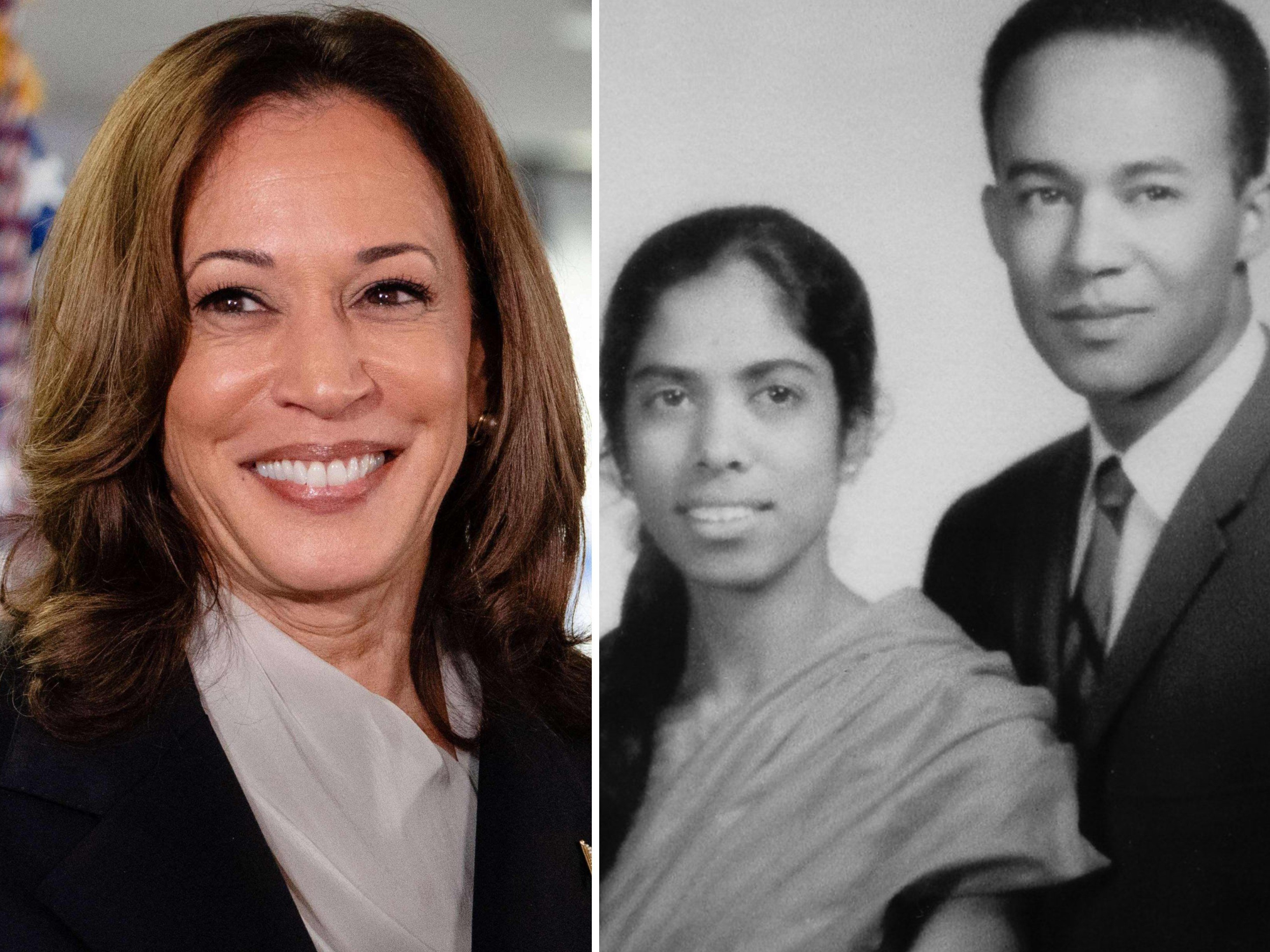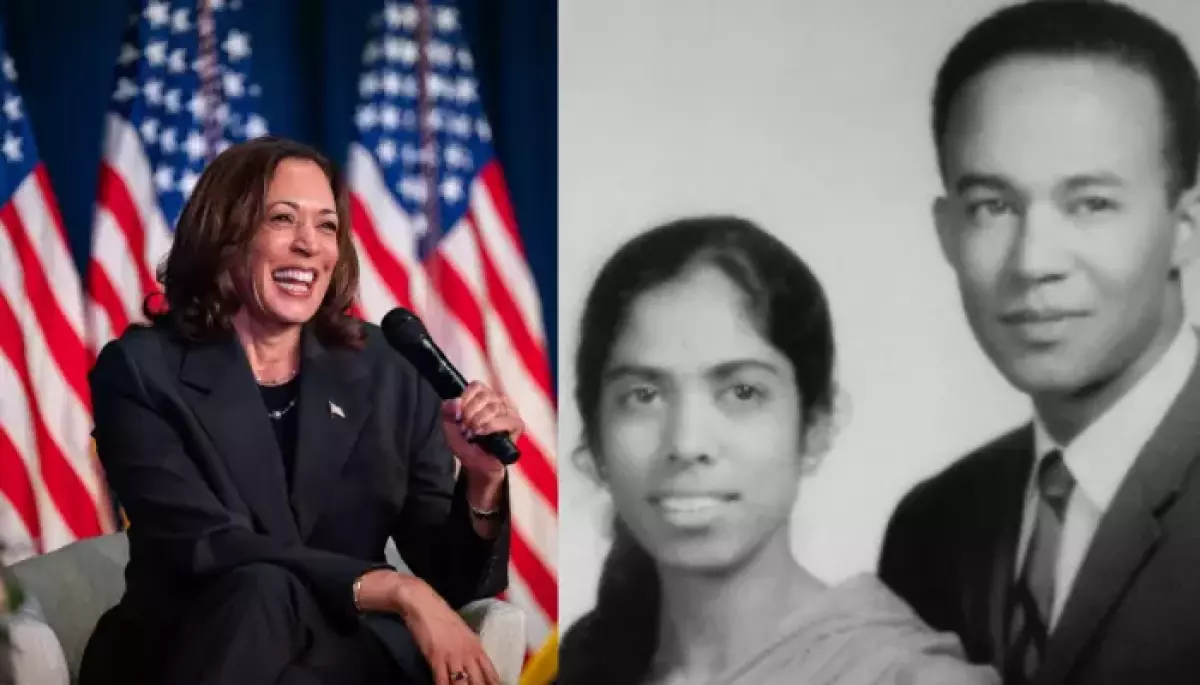Kamala Harris' Parents' Divorce: Early Life & Family Impact
How does a childhood defined by parental separation shape a future leader? Kamala Harris's journey, marked by her parents' divorce when she was just a child, illuminates the enduring impact of family dynamics on her personal and professional trajectory.
The story of Kamala Harris is one of resilience, determination, and the enduring influence of family. Her parents, Shyamala Gopalan and Donald Harris, met in the vibrant intellectual atmosphere of the University of California, Berkeley, during the early 1960s. United by a shared passion for civil rights, they embarked on a relationship that would eventually lead to marriage and the birth of two daughters: Kamala, born in 1964 in Oakland, California, and Maya, born in 1967. However, the union that began with such promise faced its own set of challenges. The couple separated when Kamala was just five years old, and two years later, at the age of seven, their divorce was finalized. Despite this early disruption, the young Kamala would forge strong bonds with both her parents, navigating the complexities of a family fractured by separation.
| Attribute | Details |
|---|---|
| Full Name | Kamala Devi Harris |
| Date of Birth | October 20, 1964 |
| Place of Birth | Oakland, California |
| Age (as of 2024) | 60 years old |
| Parents | Shyamala Gopalan Harris and Donald Harris |
| Education |
|
| Career Highlights |
|
| Political Party | Democratic |
| Key Policies/Areas of Focus | Criminal justice reform, healthcare, climate change, economic equality |
| Memoir | The Truths We Hold: An American Journey (2019) |
| Official Website | White House - Vice President Kamala Harris |
In the wake of the divorce, Kamala and her younger sister, Maya, primarily grew up with their mother, Dr. Shyamala Gopalan Harris, a brilliant scientist who served as a profound influence. Shyamala, described as "smart and tough and fierce and protective" by Kamala, instilled in her daughters a sense of purpose, resilience, and a deep commitment to social justice. The family's move to California after a brief stint in the Midwest, where Donald Harris was working, further shaped Kamalas upbringing. While Donald Harris was teaching at Stanford University in 1972, Kamala spent weekends with him in Palo Alto, maintaining a connection with her father despite the geographical distance and the complexities of the custody arrangement.
- Ella Langleys Hungover Album Release Date More
- Luke Beasley Age Income The Luke Beasley Show All You Need To Know
The early separation, however, created tensions, and the relationship between Kamala and her father became strained, as detailed in her memoir, "The Truths We Hold". This situation stemmed from Kamala's childhood and the divorce between her parents. Despite the challenges, Kamala successfully navigated her parents' separation, carrying both of their legacies forward. Her mother's strength and unwavering support provided a solid foundation, while her father's presence, even if less consistent, contributed to the multifaceted person she would become. Kamala recalls, in her memoir, inviting both of her parents to her high school graduation, a gesture that speaks volumes about her ability to maintain connection and appreciation for both of them despite their personal differences. This maturity and approach is what shaped her leadership style.
Donald and Shyamala met in 1962 and married shortly thereafter, but the divorce occurred a decade later. According to the article, the divorce between Kamala Harris' parents was bitter. The fissures in their relationship largely stem from Kamala's childhood. In a 2018 essay, Donald Harris provided more details on their relationship. In "The Truths We Hold," Harris detailed her upbringing and explained what led to her parents separation. As the Vice President's parents were civil rights activists, the family environment fostered an environment of social awareness from the beginning. Both of the parents were immigrants. For Kamala, having parents with such varied backgrounds helped her form a broader understanding of the world, which greatly helped her leadership style.
Kamala Harriss story serves as a testament to the power of family, even when it undergoes significant transitions. Her early experiences, marked by the separation of her parents, undoubtedly played a role in shaping her character and her perspective on the world. The influence of her mother, a strong and independent woman, instilled in her the values of resilience, determination, and a commitment to justice, while her relationship with her father contributed to her understanding of diverse perspectives. From her roots in Oakland, California, to her rise to the highest echelons of American politics, Kamala Harris's journey is deeply intertwined with the story of her family, and that connection continues to resonate in her work today.
The impact of parental divorce on children can be profound, as the emotional and practical adjustments required can be significant. Research has shown that children of divorced parents may experience a range of emotional responses, including sadness, anxiety, and anger. These feelings can be particularly acute during the initial period of separation, as children grapple with the changes in their family structure and routines. However, as Kamala Harris's story shows, the long-term effects of divorce are not predetermined. Her ability to maintain strong bonds with both parents, despite the early separation, demonstrates resilience. By embracing her diverse heritage and the lessons learned from her upbringing, she transformed what could have been a source of adversity into a foundation for strength and leadership.
The story of Kamala Harris also underscores the importance of supportive environments in the aftermath of parental separation. For Kamala, the guidance and nurturing of her mother, Dr. Shyamala Gopalan, played a crucial role in her development. Shyamala's influence, coupled with the ongoing connection with her father, provided Kamala with a sense of stability and a framework for understanding her place in the world. Both parents were immigrants and had varying backgrounds and professions, which helped Kamala create a broader understanding of the world, an attribute that has greatly aided her in her career. The move to California after a few years in the Midwest also became a new beginning for the family.
In her memoir, Kamala Harris also talks about the impact of her parents' divorce and explained their falling marriage. The ability of a child to thrive after a parental separation is often linked to the level of cooperation and support provided by both parents. Even though her parents were separated, Kamala's ability to maintain a relationship with both, as evidenced by her invitation to them at her high school graduation, indicates the strength of her character. This speaks volumes about her capacity to manage familial complexities with grace, an attribute that is essential for leadership. In the 2018 essay, Donald Harris delved into further details about his relationship with Kamala, shedding light on the family's challenges and the evolving nature of their connections.
The presence of her parents, Shyamala and Donald Harris, has been influential in Kamala's life, especially when she was starting her career. The Vice Presidents parents are immigrants and have had a deep influence on her life, particularly in shaping her ideals and worldview. Kamala Harris has two identities. Her mother was from India, and her father was from Jamaica, making her the product of a diverse background. This duality has informed her worldview and leadership, offering her a unique perspective on the complexities of the modern world. The experience of living in different places like Madison, Wisconsin, has had a profound impact. The report added that the divorce between Kamala Harris' parents was bitter. The family history reveals both the challenges and the triumphs. Her journey, shaped by her early family experiences, provides a narrative of resilience and adaptation, with the values of hard work and dedication, which her parents instilled.
Furthermore, the impact of family extends beyond the immediate relationships to encompass the broader community and cultural influences. Kamala and her sister, Maya, were raised in an environment that celebrated both their African and Indian heritage, ensuring they grew up with a strong sense of identity and belonging. The importance of her mothers role in her life is also noted. Dr. Shyamala Gopalan Harris, a scientist, passed away in 2009. Like her sister, Maya Harris went on to become a lawyer, graduating from the University of California at Berkeley and Stanford Law School. Her sister also shares a bond with their mother, Maya Harris. The sisters were primarily raised by their working, single mom, Dr. Shyamala Gopalan Harris.
In 1972, Donald Harris was teaching at Stanford University, where Kamala would spend weekends while living in Berkeley with her mother, showcasing her ability to maintain family connections despite the geographical distance and differing custody arrangements. Kamala Harris's parents divorced when she was just seven, so Harris credits her single mother for her upbringing. Throughout her life, Kamala Harris's parents' divorce has been a defining experience, shaping her character. Her parents divorced when she was 7 years old and she was largely raised by her mother. Kamala Harris's parents were civil rights activists. These formative years and the subsequent challenges and triumphs of her family, continue to resonate in her life.

What Ethnicity is Kamala Harris’ Parents Unveiling Her Roots Babies

Kamala Harris’ ‘Marxist’ father missing from the audience for her DNC

Meet US Vice President, Kamala Harris' Mother, Who Raised Her After